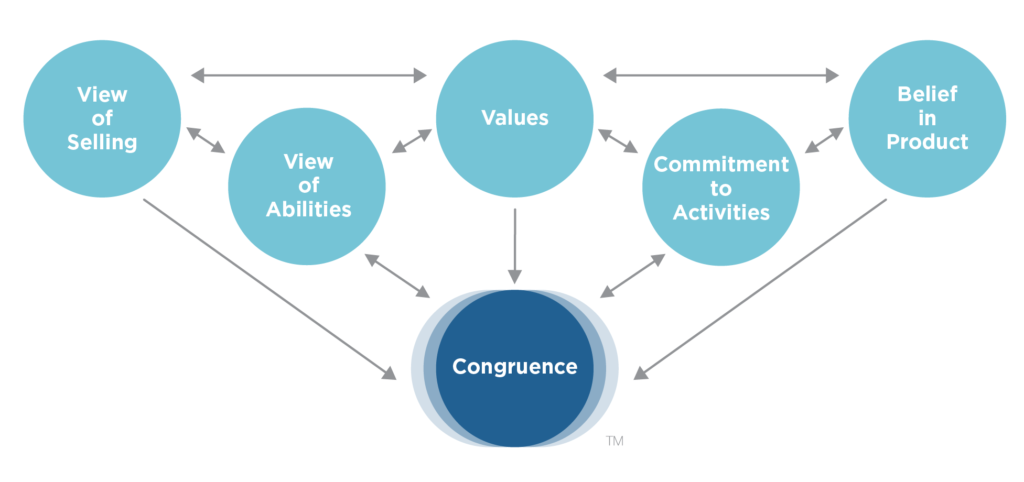Want More Sales Conversations? Start With What You’re Telling Yourself

Sales has always meant navigating highs and lows, dealing with rejection and remaining focused in the face of new business demands and pressures. Lately, though, it’s as if those pressures have been magnified times ten. As the sales environment has grown more complex, one of the biggest challenges salespeople are confronting is an internal one: how to stay self-motivated when sales conversations are harder to come by, buying cycles are only getting longer, buying committees are larger than ever, customer expectations are higher, economic & political uncertainties remain, and a highly competitive marketplace makes differentiation that much more elusive.
Exacerbating this issue is the fact that sales training and coaching doesn’t always help salespeople with these internal motivation issues. These interventions typically emphasize sales tactics, activities and other techniques for hunkering down and finding new strategies of outreach to help the rep regain momentum. Unfortunately, managers and salespeople alike usually end up frustrated when the needle still won’t seem to budge.
The reason this kind of training and coaching isn’t creating the impact they’re looking for is simple: It only addresses one of the sales conversations a salesperson has — the conversation with their customer. Unless you address the other critical sales conversation — the conversations salespeople are having with themselves — self-belief and self-motivation issues will impede their progress at every step.
What happens next is all too common: Salespeople keep struggling, their confidence, motivation and engagement drop even further, and they find themselves trapped in a vicious cycle of defeat. Many begin to question whether this even a profession they still want to be in.
The Impact of Mindset on Sales Success
Regardless of how many sales techniques someone has mastered or how knowledgeable they are about your solutions, if their mindset is working against them, they will hit a brick wall. That’s just the simple truth. We not only see it every day in practice, our research also bears it out. When we conducted a survey looking into the factors that make a difference in sales performance, 84% of sales leaders told us that beliefs (mindset) and values (a general desire to create value for the customer) are at least as important as selling skills and product knowledge. And yet that same study found that only 26% of sales leaders rated their organization as effective at developing these factors in their salespeople.
This is not just putting sales goals at risk; organizations also run the risk of squandering talent and losing good people if they don’t rethink the way they’re coaching and developing their sales teams. Product knowledge and sales tactics are important, but they’re simply not enough. Just think about how often people know intellectually what they need to do to get the results they want and yet still don’t do it. These inner conversations salespeople have with themselves get to the heart of the emotional side of selling, and they are pivotal.
As we emphasize in our book Listen to Sell, sales success is more an issue of who you are and what you believe is possible than what you know. But that doesn’t mean you can’t develop and coach around these inner factors. In fact, not only can mindset, motivation and drive be developed and nurtured, they must be if we want to improve sales performance and unleash the full potential of our people. This has always been the case, but against the backdrop of today’s complex selling environment, it’s never been more urgent.

There are several key areas related to mindset that sales leaders should be focusing on as part of an overall sales performance, development and coaching strategy.
Self-Motivation Starts with Purpose
The ability to ask great questions that get below the surface and uncover deeper-seeded concerns or fears is one of the hallmarks of effective sales conversations, and the same applies when it comes to a salesperson’s inner conversations. In fact, before you can have productive sales conversations with your customers, you have to have a thoughtful conversation with yourself. And the first question every salesperson needs to stop and ask themselves is the most fundamental one: Why are you in sales?
It may seem obvious or basic, but to be successful in sales, you need to convince people — and the first person you need to convince is yourself. The why is your purpose; it’s what motivates you to go out and do the things you need to do, day in and day out, to achieve your goals. Salespeople who aren’t clear on why they’re selling find it difficult to stay in the game when things get tough. Those emotional factors will heavily influence a person’s commitment, resilience and, ultimately, their performance.
People are motivated by different things. It could be a desire to make a difference for their customer, whether that’s by selling a life-saving medical device or services that increase efficiency or a product that provides financial security for their family or peace of mind. Others might be motivated by the financial freedom that comes with a higher income. Maybe they want to be able to travel or send their children to top-notch schools or donate generously to charities that are important to them.
No different than with customer conversations, the conversation with yourself about purpose has to be deliberate, planned and focused on uncovering what the true motivations are. Making money or being named to the top earner’s club may be the first answer that comes to mind, but often that’s just superficial and there’s a deeper reason. This conversation with yourself is about digging for the why behind that why and paying attention to what you discover — because great questions are worthless if you aren’t listening to the insights they reveal.
Motivations are personal and individual. The important thing is for salespeople to do the work to understand what drives them and then connect that driving force to their goals. When what you’re doing is rooted in something that’s meaningful to you personally, you’re much more likely to put in the necessary work, get creative when problems arise and push past whatever obstacles are in your way. And that’s what makes people much more likely to achieve their goals.
The Sales Conversations About Internal Beliefs
Finding purpose is an intentional conversation salespeople need to continually have with themselves. But not all of those internal conversations are as conscious and deliberate. In fact, every salesperson is having hundreds of conversations with themselves daily that reflect what they believe about themselves and the world around them. This inner monologue is another facet of the emotional factors that impact decision-making, prioritization and sales performance, and it’s constantly reinforcing beliefs that will affect a person’s attitudes, behaviors and engagement.
Self-beliefs can often be rooted in childhood experiences and come with hard-to-shake labels attached: You were the shy one or the impulsive one or the math whiz or the technophobe. Over time, these labels become more ingrained and start to make up the system of self-beliefs that influences the way you perceive yourself, what’s possible for you to achieve and, as a salesperson, how you feel about what you’re selling.
Internal beliefs are extremely powerful, in both positive ways and self-limiting ways. For example, salespeople who view themselves as being tech savvy will probably be more willing to learn how to use new sales enablement tools and will be more comfortable when emerging technologies are introduced into sales processes, products or customer workflows. They’ll have the confidence to dive in and try out the latest innovations, and as a result, they’ll get the benefits of them faster than others might.
This shows how positive internal beliefs can help fuel self-motivation and performance. But frequently people are grappling (often unconsciously) with negative self-beliefs that hold them back. We’ve seen it time and time again: Salespeople will sell what they genuinely believe is possible for them to sell. If you don’t see yourself as having the confidence or ability to sell to a certain industry or level within an organization, for example, your self-talk will keep reinforcing those doubts, which will impact your behaviors and eventually turn those beliefs into a self-fulfilling prophecy.
As mentioned, salespeople have many inner conversations with themselves throughout the day, but the five self-beliefs that are most influential in driving sales success are:
- View of selling
- View of their abilities
- Values alignment
- Commitment to activities
- Belief in product(s)
Because a person’s beliefs influence how they behave, each of these can either inhibit or unleash sales performance and potential. Unfortunately, as our research shows, too many organizations are neglecting to address these mindset issues in sales training and coaching, which means many salespeople are getting tripped up by any number of negative, limiting self-beliefs. In Listen to Sell, we go into depth on each of the five self-beliefs, exploring how they affect sales behaviors and the specific steps people can take to shift their mindset if negative beliefs are holding them back.
A Successful Sales Mindset is All About Alignment
Just as salespeople need to get clear on their purpose, they also need to tune in more closely to what their self-talk is telling them. Developing a more positive, productive mindset in any of the five above areas is a step forward; the ideal scenario is getting them all in sync.
A gap in any one of these areas can pull on some or all of the others out of alignment; depending on the size of the gap, this misalignment can lead to self-doubt, inner conflict, disengagement, resistance or outright discouragement. The impact of this misalignment plays out in very noticeable ways: Activity levels drop, performance suffers and achievement drive slows down.

We developed the Sales Congruence Model to help salespeople listen to and recognize how their internal beliefs affect their overall performance and then take steps, through skills and mindset, to pull their beliefs into alignment. The Sales Congruence Model acknowledges that:
- Gaps or imbalance between areas can cause mental and emotional blocks, which inhibit sales success. (This is often the case when values or belief in product conflicts with view of selling or of abilities.)
- The wider the gap, the more likely the salesperson will experience internal stress and feel stuck.
- Bringing beliefs into congruence is powerful because it releases achievement drive.
The Model isn’t a magic pill, though. Salespeople, with the support of coaching by their managers, have to learn to work the model — and keep working the model — to keep all five areas in sync.
Shifting Sales Mindsets is Possible — And Essential
In Listen to Sell one of the biggest takeaways for salespeople is this: The most significant variable in your sales success is you. Mindset can limit someone’s potential or remove all the barriers in their way. It’s a message sales managers and leaders also need to take to heart, because we’re doing our teams a disservice if we’re not acknowledging the power of mindset, motivation and self-belief in sales. To attract, retain and grow the talent we need, these issues must be integrated into the way we develop and coach our salespeople.
Here are some key questions to consider to expand sales conversations:
- What needs to happen to get your people to have more sales conversations?
- Do you believe in your people and see possibilities they may not see in themselves?
- Are your coaching discussions working with your salespeople on their inner conversations about mindset, purpose and self-belief with the same degree of emphasis and attention as their conversations with customers?
- Are your salespeople aligned for success? Where are there gaps? Are there any common themes emerging?
Listen to Sell: How Your Mindset, Skillset, and Human Connections Unlock Sales Performance (from Page Two Books) is now available. Get a free preview of the book, find easy ordering links, hear what other industry leaders have to say about it and inquire about bulk ordering or speaking engagements here.

Executive Partner & Board Member
Related Blog Posts



